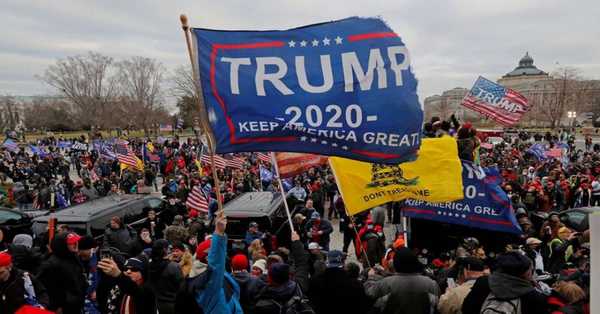Trump’s consistent attempts to reject and denigrate the outcome of the US electoral system has no precedent
January 6 will be remembered as a black and bleak day in the annals of the history of the United States (US), when the world’s oldest and most powerful democracy allowed its legislative heart — the US Capitol — to be stormed by supporters of President Donald Trump. Encouraged by a sitting president who has lost the election for a second term, the protesters saw this as a last-ditch, desperate attempt to overturn the Joe Biden victory. This tragic turn of events in what should have been an orderly transfer of governance in a democracy has resulted in four deaths and, alas, the US stands diminished in its own esteem and that of its well-wishers.
The fact that this mass protest was announced days in advance and that the much-touted security system of the US capital and the over-protected legislature allowed this violence to unspool (with possibly tacit support from within) points to many omissions of institutional ineptitude and worse, socio-political turpitude. Led by Trump and his extreme right, largely white support base, a section of US society was rejecting both the rule of law and the principles enshrined in the US constitution with impunity.
The white supremacist disregard for the sanctity of law has been on the increase during the Trump presidency and the contrast with how Washington dealt with peaceful protests by African-Americans in recent months is illustrative of the deep racial fissures that still fester in US society. While the Wednesday storming of Capitol Hill was devoid of large-scale violence and had some comical visuals, a worst-case scenario would have been that of heavily-armed extremists taking control of the US Congress and the military having to step in. The fact that preliminary reports refer to vehicles with arms, ammunition, pipe-bombs and Molotov cocktails being found in the vicinity adds to the anxiety of what could have happened on Wednesday.
However, to the credit of the US political ecosystem and its inherent resilience, the commitment to both constitutional principles and rule of law was reiterated by the US Congress within hours of the deplorable attack. Led by Vice-President Mike Pence in the Senate and Speaker Nancy Pelosi in the House of Representatives, the shaken and outraged legislators, in the main, condemned the violence and distanced themselves from a president who had brought disgrace to the high office he held. The Biden victory as declared by the electoral college was upheld and it is expected that the White House will have a new occupant on January 20 and that US democracy will be back on track.
But this will be a wounded country whose democratic credentials and internal socio-political cohesion will be seen to be tainted and in need of urgent repair. Biden’s priority, hence, will be one of domestic healing and restoring US credibility in the international arena. The challenge to the rhythms of normative democracy symbolised by January 6 will also shrink Washington’s ability to provide substantive and persuasive leadership to the complex global challenges that the world was facing in 2020. These include the 3C spectrum – the climate crisis, China, and Covid-19.
A nettlesome Trump legacy issue that will test the Biden team will be the China conundrum, which has a distinctive salience for many nations, including India. While there will be no dearth of critics using January 6 to take potshots at the US and its penchant to “export’” democracy and lead the democratic cluster against Beijing, the American ability to self-correct after a setback is commendable.
Trump’s consistent attempts to reject and denigrate the outcome of the US electoral system has no precedent and his term in office will be analysed for years. But the interregnum till January 20 is fraught with some dangerous security-related exigencies. As per US law, the president is at the apex of the nuclear command authority and is “the finger on the button”. The codes are contained in a briefcase referred to as the “football” and this is carried by an aide who is always in close proximity to the president.
In the immediate aftermath of the Capitol Hill attack, Trump was missing and close aides revealed that POTUS had “lost it” and appeared deranged. For the US, and the world at large, this is cause for deep concern and one can only hope that the professionals in the system will firewall any impending recklessness by Trump. This low probability exigency, which would have an apocalyptic consequence, is sharply attenuated in relation to Iran and merits mention.
The US has no doubt dodged a bullet on January 6, but the complex pattern of events leading to it point to the inherent fragility of the democratic compulsion and the need to nurture it in a positive and normative manner.
